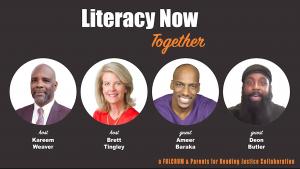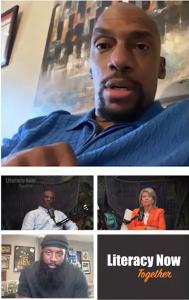From the NFL and BET to the Fight for Literacy: Two Men Confront America’s Reading Crisis

Ameer Baraka and Deon Butler, dyslexic adults who overcame childhood illiteracy and now fight for literacy justice across America
Former NFL player Deon Butler and literacy advocate Ameer Baraka—now an actor—share how dyslexia shaped their fight for every child’s right to read.
Their powerful conversation unfolds in Built Like Champions; Betrayed by Schools, the newest episode of the podcast Literacy Now, Together, co-hosted by Kareem Weaver of Fulcrum Literacy and Brett Tingley of Parents for Reading Justice. The series takes an unflinching look at the nation’s reading crisis and the people determined to solve it.
From the Field to the Front Lines
Deon Butler’s story begins on the football field. Once an ESPY-nominated tight end at Central Michigan University and later a Detroit Lion, Butler hid his reading struggles behind athletic success. His turning point came under then-position coach Sherrone Moore, now head football coach at the University of Michigan.
“Coach Moore believed in me before I believed in myself,” Butler recalls. “Imagine if every kid had that—before the struggle started.”
Butler’s time in the NFL was brief. He was cut from the Detroit Lions, unable to read the complex playbook fast enough to compete. It was then that two brutal truths became clear: illiteracy follows you, and the world does not owe you understanding.
That moment of reckoning sparked a new mission—first, to learn to read, and then to help others do the same. Butler’s journey from shame to literacy became the foundation for his advocacy. He now works to ensure that no other young person faces the same barriers. His voice has since helped shape Michigan’s literacy and dyslexia reforms and inspired other athletes to speak openly about their struggles.
From a Prison Cell to the Screen
Across from him sits Ameer Baraka, known for his role on Tyler Perry’s BET drama Zatima and his unwavering advocacy for literacy and prison reform. As a young man in New Orleans, Baraka was sentenced to sixty years for drug possession. He taught himself to read in prison, earned his GED, and began teaching other inmates to do the same.
“You shouldn’t have to go to prison to learn to read,” he says.
Years later, Baraka testified before Congress in support of the First Step Act, championed by Senator Bill Cassidy (R-LA), whose daughter also has dyslexia. The legislation mandates dyslexia screening and literacy instruction for federal inmates. “It’s the first step toward freedom through reading,” Baraka says. “But the real goal is to give kids the first step before they ever see a cell.”
A National Pattern, a Preventable Crisis
The men’s stories echo a truth recognized more than thirty years ago by the U.S. Department of Justice:
“Reading failure is most likely a cause, not just a correlate, for the frustration that can and does result in delinquent behavior.”
— U.S. Department of Justice, 1993, Reducing Recidivism Through Reading.
That report found that improving literacy dramatically reduces reoffending rates. Yet, according to research, about 42 percent of incarcerated adults are dyslexic. The same neurological difference that traps some in the criminal system fuels creativity and innovation in others—roughly 42 percent of self-made millionaires are also dyslexic. Entrepreneurs Daymond John, Barbara Corcoran, and Kevin O’Leary of Shark Tank share that diagnosis, as did Muhammad Ali, Steve Jobs, Steven Spielberg, and Tim Tebow. The difference, advocates insist, is early help.
Film, Faith, and the Power of Parents
Weaver, who appeared in LeVar Burton’s award-winning documentary The Right to Read, connects the men’s stories to a broader fight for literacy justice. “Literacy isn’t a luxury,” he says. “It’s freedom, justice, and self-determination all at once.”
That message also drives Left Behind, winner of the 2025 SoHo Film Festival Best Documentary Award. The film follows New York City mothers battling to open the nation’s first public school for dyslexic students—a mission to prevent the same heartbreak Butler and Baraka experienced.
Left Behind drew national attention after Kelly Clarkson, whose daughter has dyslexia, featured producer Larry Mullen Jr., drummer of U2, on The Kelly Clarkson Show. Together, they spoke about their children’s struggles and the film’s message: that when systems fail children who learn differently, the cost is generational. The segment led to donations from Scholastic, bestselling author Dav Pilkey, and Clarkson herself, underscoring a growing movement for reading as a civil right. The film features original music by Larry Mullen Jr. and can be streamed free through November 1 at www.LeftBehindTheFilm.com
.
The Movement Grows
Together, Built Like Champions and Left Behind are rallying points for a national literacy movement. Fulcrum Literacy and Parents for Reading Justice are working with schools, families, and community leaders to ensure that all children receive evidence-based reading instruction. Their shared mission is clear: prevention is more powerful than punishment.
Ameer Baraka:
“If someone had taught me to read by fourth grade, I would have never gone to prison.”
Their call extends to teachers, parents, and policymakers: every child deserves to read—and every adult must help make it happen.
A Call to Action
No one should have to go to prison or abandon their dreams to learn to read. Watch Built Like Champions; Betrayed by Schools and the award-winning film Left Behind to join the fight for literacy and freedom.
Resources
Department of Justice Report (1993): tinyurl.com/PrisonReading
First Step Act Overview: bop.gov/inmates/fsa/overview.jsp
Deon Butler, The Gift & The Curse: One Man’s Journey with Dyslexia – tinyurl.com/BookByDeon
Ameer Baraka, Undiagnosed: The Ugly Side of Dyslexia – tinyurl.com/BookByAmeer
Media Contact
Fulcrum Literacy
info@fulcrumliteracy.org
www.FulcrumLiteracy.org
Literacy Focus
FULCRUM
email us here
Visit us on social media:
LinkedIn
YouTube
X
Built like Champions; Betrayed by Schools
Legal Disclaimer:
EIN Presswire provides this news content "as is" without warranty of any kind. We do not accept any responsibility or liability for the accuracy, content, images, videos, licenses, completeness, legality, or reliability of the information contained in this article. If you have any complaints or copyright issues related to this article, kindly contact the author above.


